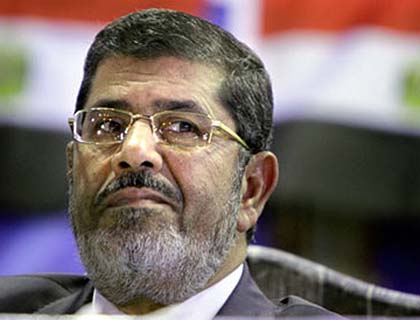The Egyptians' new President, Mr. Mohammad Morsi, in an expected move, called on Muslim-brotherhood-led parliament to reopen and resume its work on Monday, July 9. He made the remarks while the current political situation still remains terribly tumultuous. Last month, the constitutional court revoked the result of parliamentary election in which Islamic parties did quite well and occupied major parts of parliamentary seats.
The decision was justified on the basis that the political parties had not played fair in the election. According to the constitution, seats are divided among political parties and independent candidates. The Supreme Court blamed Islamic parties that they took some of their nominees into parliament through labeling them as independent.
However, the reactions of Islam-tilted political parties were harsh and many called the repeal of parliament by constitutional Supreme Court as coup by ruling military council, but finally decision was accepted because the body is authorized to announce the ultimate result of the election.
Meanwhile it should be noticed that though constitutional court is a legal body, many oppose it on account that its members were handpicked by former regime, more precisely, by former President Mr. Hosni Mobarak. Some political figures pointed finger towards military council and blamed of being behind the vote of Constitutional Court.
Military council has been widely blamed by demonstrators as well as political parties for strengthening the pillars of their power, the claim which is consistently rejected by military rulers. The invalidation of parliament was also widely interpreted as direct action of military rulers. Protestors several times took Tahrir Square to express their anger against military rulers.
On occasions there were reports of clashes between demonstrators and soldiers. In order to meet the concerns of people, it has always emphasized that right after the establishment of a civil government; they would return to their military responsibilities and would hand over the power.
The military took power right after the outstation of Hosni Mobarak regime. When demonstrators mounted pressure against the former regime and police failed to deal with rising rebellion, President Hosni Mobarak called on military to take care of the situation and restore peace and stability.
I clearly remember, though top generals continuously were warning people evacuate Tahrir and avoid demonstrations, they were surrounded and welcomed. Televisions were telecasting people along with armors of militaries, taking pictures and hugging soldiers. They were treated with high reverence.
Military had especial status and enjoyed high respect among civilians as it was generally viewed as body that stayed away from the vicious and dirty games of politics. Instead, it did well in the wars with Israel.
Such a neutral policy in domestic issues was a key factor in improving the status of military among Egyptians.
But with the outstation of Hosni Mobarak regime, there was potential body to restore peace and take the situation under control, except military. The military council was established and people were asked to avoid further disruption of the social, political and economic situation.
However, no serious opposition showed to the council as all viewed it necessary to take care of the situation in lack of a civil government, but the political situation moved in a way that fuelled suspicion about the intention of generals. In proportion to lingering of military in power, the gap started to increase between people and their previously revered military establishment. The rise of Ahmad Shafiq, army ex-chief, in the presidential election was also worrisome.
Many were claiming that none of them—Ahmad Shafiq and MohammadMorsi—were representing the revolutionaries. When the Presidential election went for the run off, and supporters of Ahmad Shafiq, before the announcement of final result, announced him as winner, took an inch the situation towards complication. But the election of Mohammad Morsi as President, who, many maintain, does not have good relation with military due to lasting antagonism of military, a kind of secular establishment, with Islamic political parties, relieved the weary Egyptians.
But it is worthy to notice if Ahmad Shafiq was elected as President, he had a better chance to build a close relation with military and with its assistance restore the terribly affected social, economic and political structures.
Now it differs.
One of the principles of President Morsi as the first President of around 80 years old Brotherhood Islamic party to challenge the power of military and pressurize it to go back to its previous neutral status. While there is nothing to show that "Generals" have any intention to retreat soon as the situation has remained yet absolutely tumultuous. They want to maintain a role in the process and do not let the country move towards a Shariah-based establishment which the founders of Muslim Brotherhood stood for initially.
With the announcement of reopening parliament Brotherhood and military enter into a new battlefield. The first parliament is responsible to bring changes to the constitution which is feared by liberals, seculars and other political parties with no Islamic background.
They are worried that Islamic parties are in majority and some of them have radical mentality that may possibly affect the constitution and establishment of democracy.
Now the question is, "Can President Morsi reopen his party-led parliament or not?" and "What would be the reaction of military council and constitutional court?" There is one thing for sure, with a favoring parliament; it would be highly difficult for President to realize the goals and objectives of Brotherhood.
On other hand, military will try its most to restrict the power of President and the process hints to a tense relation between the two strong bodies. Now let's see who will succeed in this new political battlefield.

